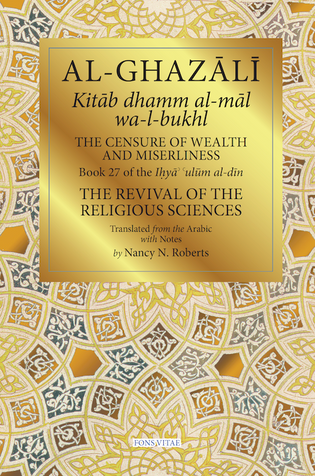Al-Ghazali: The Censure of This World (Book 26 of The Revival of the Religious Sciences)
Fons Vitae
- SKU:
- BKFV1083
- MPN:
- 9781941610640
Title: Al-Ghazali: The Censure of This World (Book 26 of The Revival of the Religious Sciences)
Author: Matthew Ingalls
ISBN: 9781941610640
Publisher: Fons Vitae
The Censure of This World is book 26 of the forty books of the Revival of the Religious Sciences (Iḥyāʾ ʿulūm al-dīn). It is the first of five books that censure specific perils, the others being The Censure of Greed and the Love of Wealth; The Censure of Fame and Hypocritical Ostentation; The Censure of Pride and Vanity; and The Censure of Deceit.
This book covers the broadest topic; namely this world, while the following books delve into specific traits. Al-Ghazālī approaches the topic of this world from the widest possible perspective; that being, the extent of our existence in this world relative to pre-eternity and the eternity of the hereafter. Although our lives here are minute in terms of existence, this time and our choices are crucial to our fate in the next life.
The present work addresses the proper attitude we should take toward this world, its dangers to our spiritual well-being, its distractions and preoccupations, and most importantly, its threat to our future in the next world. The subject is covered in an introduction and five chapters; through ḥadīth, traditions, and parables, al-Ghazālī deftly illustrates the dangers of this world around us. The last chapter is a meditation on why people cannot simply live in solitude far from society, the need people have to interact with others, and how this gives rise to the occupations in this world and their role and effect on society as a whole.
Being the twenty-sixth book of The Revival of the Religious Sciences (Ihya’ ‘ulum al-din), The Book of the Censure of This World (Kitab Dhamm al-dunya) seeks to persuade its reader of the folly of worldly pleasures and possessions. To do so, al-Ghazali begins with a collection of Islamic primary-source texts that speak to the dangers of this world from a variety of angles. He then adds to this collection fourteen metaphors for this world that illustrate its perfidious nature. In a third subsection, al-Ghazali provides an original rationale for renouncing worldly enjoyments, and he furnishes his reader with a blueprint for determining what constitutes “this world” in its most dangerous sense. In a fourth and final subsection, al-Ghazali applies a sociological theory to enumerate the essential human vocations and identify the mechanisms through which these lead people away from God.
 Canadian Dollar
Canadian Dollar















